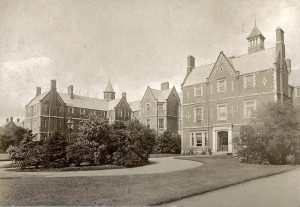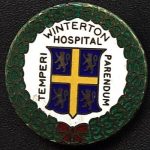
A family tragedy inspired a career spanning almost 40 years for dedicated nurse and NHS stalwart Sharon Airey.
Sharon, who is originally from Hartlepool, signed up as a student nurse in 1985 after witnessing her uncle’s mental health struggles as she was growing up.
She has gone on to play a key role in shaping services across Tees, Esk and Wear Valleys NHS Foundation Trust – spearheading a range of innovative projects.
“My uncle was a very gentle soul, but his life was hard. He had an undiagnosed psychosis which was never treated. I felt so sorry for him,” she said.
“My original career ambitions were written in stone, as it were, as I wanted to work in geology. When my uncle died, I changed my mind – I wanted to work in psychiatry instead.”
Signing up for a life of caring

Sharon was 20 when she started at Winterton Hospital in County Durham as a student nurse. Her wages at the time were £200 a month, and she was expected to live on site.
The job initially came as quite a culture shock. Instead of the inclusivity she had grown up with in Hartlepool, she found Winterton a rather conservative community.
“It took me a while to settle,” she recalls. “At one point I thought about leaving, but my mum persuaded me to stay, and I am glad I did.
“It was tough, though, at first. There was an embedded caring culture at the hospital, but one very different from what we have today.”
Sharon worked in different departments across Winterton during her three years of training, but she particularly loved the male long-stay wards – which reminded her of her uncle.
After qualifying as a registered mental health nurse, she then stayed at Winterton for a further three years, caring for older people with dementia.
“It was hugely physically demanding,” she said. “There were no lifts or hoists, you did all the lifting yourself. I must have done 10,000 steps in just the first hour of each shift!”
A chance to develop new skills

Sharon moved to a new role in Slough in the 1980s, at a specialist mental health unit attached to a general hospital – staffed by people from around the world, who cared for patients of all nationalities.
“It was a brilliant experience. My manager would put an answer machine on in the ward office and we would spend all morning with the patients, it was wonderful,” she said.
“I absolutely loved every day I worked there. It was very forward thinking. We wore our own clothes – so that patients and staff blended, and we ate our meals with the patients as well.
“What I learned in that role was invaluable – but I also learned that I needed to be in more senor positions to help influence changes, which is why I went into team management roles.”
Sharon moved back north after starting a family in the mid-1990s and took a part-time job at The Friarage in Northallerton, where she worked with older people.
She went on to serve as a staff nurse for ten years, before becoming one of the first people to work in a mental health liaison team in 2005. Within a decade, she was managing it – and still is.
Influencing change for the good
“I became a ward manager at The Friarage in 2012, then managed the liaison team as well, helping it to develop. I had always wanted to influence change, and now I could,” she said.
“When my ward closed, I became a full-time liaison manager and then added the memory service to my portfolio during the pandemic.”
Sharon played a key role in helping patients access support during Covid – working with teams and consultants to offer online and phone assessments, as well as liaising with voluntary services.
She also supported a team of occupational therapists – who devised videos to allow patients to access what would have been in-person sessions pre-Covid.
“We gained accreditation from the Memory Services National Accreditation Programme for our work during Covid,” she said.
Sharon has seen her role shift back to liaison since the final lockdown and, just last year, she supported the launch of the successful First Contact Practitioners project in Hambleton.
Her latest project involves working with people in care homes to avoid admission to acute wards or mental health beds – and permission has just been granted for her proposal for liaison to work with South Tees Hospital at Home team on virtual wards.
Looking to the future
“I’m planning to retire at 60 and hand the baton over. I work with some smashing nurses and know that they are always striving to improve care,” she said.
“Our Trust values of respect, compassion and reasonability should be a philosophy as to how we all work together.
“I’m proud to work in the NHS. I’ve learned so much and grown so much and become a strong, independent woman as well. It is good to know my work has helped support people.”